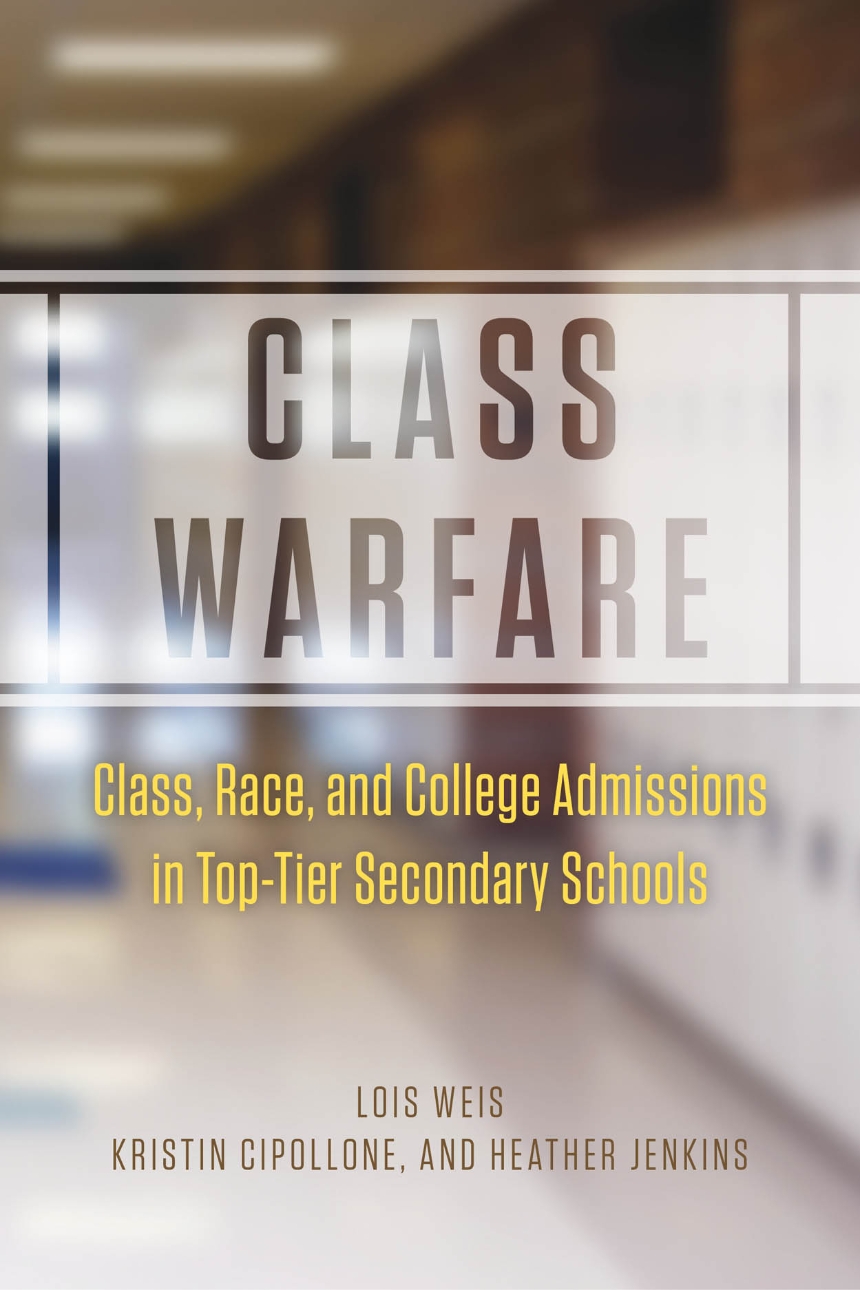Class Warfare
Class, Race, and College Admissions in Top-Tier Secondary Schools
9780226134925
9780226135083
Class Warfare
Class, Race, and College Admissions in Top-Tier Secondary Schools
Stories abound about the lengths to which middle- and upper-middle-class parents will go to ensure a spot for their child at a prestigious university. From the Suzuki method to calculus-based physics, from AP tests all the way back to early-learning Kumon courses, students are increasingly pushed to excel with that Harvard or Yale acceptance letter held tantalizingly in front of them. And nowhere is this drive more apparent than in our elite secondary schools. In Class Warfare, Lois Weis, Kristin Cipollone, and Heather Jenkins go inside the ivy-yearning halls of three such schools to offer a day-to-day, week-by-week look at this remarkable drive toward college admissions and one of its most salient purposes: to determine class.
Drawing on deep and sustained contact with students, parents, teachers, and administrators at three iconic secondary schools in the United States, the authors unveil a formidable process of class positioning at the heart of the college admissions process. They detail the ways students and parents exploit every opportunity and employ every bit of cultural, social, and economic capital they can in order to gain admission into a “Most Competitive” or “Highly Competitive Plus” university. Moreover, they show how admissions into these schools—with their attendant rankings—are used to lock in or improve class standing for the next generation. It’s a story of class warfare within a given class, the substrata of which—whether economically, racially, or socially determined—are fiercely negotiated through the college admissions process.
In a historic moment marked by deep economic uncertainty, anxieties over socioeconomic standing are at their highest. Class, as this book shows, must be won, and the collateral damage of this aggressive pursuit may just be education itself, flattened into a mere victory banner.
Drawing on deep and sustained contact with students, parents, teachers, and administrators at three iconic secondary schools in the United States, the authors unveil a formidable process of class positioning at the heart of the college admissions process. They detail the ways students and parents exploit every opportunity and employ every bit of cultural, social, and economic capital they can in order to gain admission into a “Most Competitive” or “Highly Competitive Plus” university. Moreover, they show how admissions into these schools—with their attendant rankings—are used to lock in or improve class standing for the next generation. It’s a story of class warfare within a given class, the substrata of which—whether economically, racially, or socially determined—are fiercely negotiated through the college admissions process.
In a historic moment marked by deep economic uncertainty, anxieties over socioeconomic standing are at their highest. Class, as this book shows, must be won, and the collateral damage of this aggressive pursuit may just be education itself, flattened into a mere victory banner.
288 pages | 7 tables | 6 x 9 | © 2014
Education: Education--Economics, Law, Politics, Higher Education, Pre-School, Elementary and Secondary Education
Sociology: Individual, State and Society, Social Organization--Stratification, Mobility
Reviews
Table of Contents
Acknowledgments
1. Class, Race, and College Admissions in a Changing US Context
2. Schooling in Privileged Spaces
3. Class Practices and the College Process in a Suburban, Public High School: Creating Distinction around the Highly Selective College-Going Self
4. Micromanaging the College Admissions Process: Leaving Nothing to Chance at Matthews Academy
5. “Outsiders Within”: Relative Opportunities for Low-Income Black Students in Elite Private Secondary Schools
6. Race and Class Matters
7. Class, Race, and Postsecondary Destinations in New Global Circumstances
1. Class, Race, and College Admissions in a Changing US Context
2. Schooling in Privileged Spaces
3. Class Practices and the College Process in a Suburban, Public High School: Creating Distinction around the Highly Selective College-Going Self
4. Micromanaging the College Admissions Process: Leaving Nothing to Chance at Matthews Academy
5. “Outsiders Within”: Relative Opportunities for Low-Income Black Students in Elite Private Secondary Schools
6. Race and Class Matters
7. Class, Race, and Postsecondary Destinations in New Global Circumstances
Epilogue: Details and Reflections on Theory and Methods
Notes
References
Index
